Monday schedule of a caretaker Taoiseach:
- Attend the MasterCard function at the Technology Hub, Leopardstown, Co Dublin, for announcement of 1,500 new jobs over the next three to five years.
- (Sit in car and exit wet city roads past swathes of properties owned by foreign hedge funds, who prefer to lease one bedroom apartments at €2,500 per month rather than sell them. Listen to radio reports of Brazilian father arrested in Athenry and the growing campaign to prevent his deportation).
- Arrive in Athlone, Co Westmeath, to be met by a caretaker Minister of State who lost his seat in the General Election. The said Kevin 'Boxer' Moran remains the most active advocate of property owners, worried beyond distraction by the consequences of flood damage.
- (While wading through the waterlogged streets, describe Sinn Féin’s five planned rallies as "an unwelcome development"...the latest stage in a campaign of "intimidation and bullying".)
Is anyone joining up the dots?
What would the risk assessment consultants say about Fianna Fáil cutting a deal with Sinn Féin?
They're from the same gene pool. It would be like marrying a first cousin.
Or look at past history. Let them into the garden and soon they’ll be in the kitchen...or the bedroom.
Better to stand your fragile ground and fling stones.
The IRA - going…going…
The unavoidable truth is Sinn Féin have arrived. It remains to be seen if their stay will match or outstretch the IRA's long goodbye.
The endgame for a cohort of the republican movement’s phase as politicians by day and paramilitaries by night began in earnest at this time 15 years ago. On the weekend before Christmas 2004, nearly £30m was robbed from the Northern Bank in Belfast city centre.
In a two-fingered gesture to the PSNI that included the current Garda Commissioner, Drew Harris, thousands of pounds from the stolen loot was smuggled into the supposedly secure police sport an social centre in posh south Belfast and planted in an officer’s locker.
That Northern Bank robbery was meticulously planned. The murder of Robert McCartney in Belfast a month later was not. It sent the republican movement into such a tailspin that the IRA actually offered to shoot the perpetrators from within their own ranks.
The 33-year-old victim was a totally innocent man who tried to intervene in a bar-room row and got stabbed to death for his chivalry. Some of the clientele had earlier been to Derry for the Bloody Sunday anniversary commemorations.
His sisters and partner were ordinary people from Belfast's Short Strand with no previous experience in the public arena. They brought their grievance to the United States where they were given prominence at the Saint Patrick's Day White House events and Sinn Féin were cold-shouldered.
Senator Edward Kennedy said "there is a time to hold them and a time to fold them" and told the IRA to leave the stage. From the podium at an Ireland Funds dinner, Senator John McCain delivered a similar blunt message to then Sinn Féin president Gerry Adams.
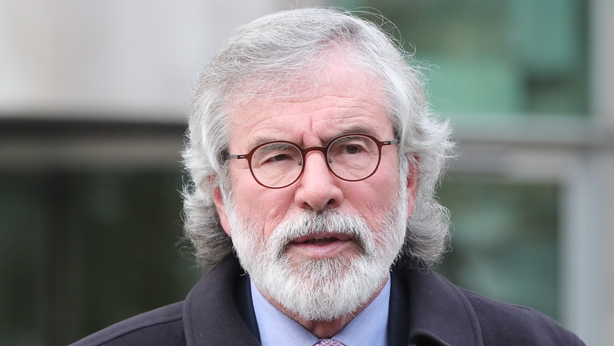
In Dublin at a meeting in government buildings, the then taoiseach Bertie Ahern had a heated discussion with Gerry Adams and Martin McGuinness and suspended contact with them.
Duplicity ran out of road during those months of 2005.
Those two events - crimes that have never been fully solved - especially the brutal killing of an innocent man from within the nationalist community, brought an end to the Armalite in one hand and ballot box in the other strategy of the republican movement.
The man who delivered the public farewell to arms
Seanna Walshe is an example of that process of change.
He was born in the same Short Strand area of Belfast where the McCartneys lived. He was 20 in 1975 when he was arrested as part of an IRA gang caught robbing a bank and sentenced to five years in jail.
He was three months out of prison when he was arrested and sentenced for possession of a rifle. His next phase of release and return to jail was caused by his arrest for making explosives and mortar bombs.
In July 2005 Seanna Walsh became the first person since 1972 to publicly represent the IRA without wearing a mask.
He appeared on a DVD, with the tricolour in the background, reading out a statement from the IRA Army Council, announcing an end to its armed campaign.
He was 42 at the time of the prisoners' release following the Good Friday Agreement. He had spent almost half his life in jail.
Nowadays he is a Sinn Féin member of Belfast City Council and is employed as the manager of the James Connolly Visitors' Centre in west Belfast.
The man who was OC (officer commanding) of IRA prisoners when the Hunger Strikes ended in the H Blocks in 1981 wore a fetching waistcoat at the Sinn Féin Ard Fheis in November 2019.
The DUP role in the journey
The DUP have been a significant factor in Sinn Féin's development and growth as a political party. If the SDLP were persuaders, the DUP played enforcers.
Ian Paisley and his chief strategist, Peter Robinson, insisted that IRA weapons decommissioning would take place and a policy of support for the police adopted by Sinn Féin before the DUP would enter power-sharing with republicans.
They first became partners at Stormont in May 2007 but the DUP pressure on republicans to follow exclusively peaceful means continues.
The latest example of that chemistry occurred last month. Days after she crossed the border and featured as a Late Late Show guest on Brexit night, Arlene Foster put the case to Michelle O'Neill that it was her turn to make a gesture.
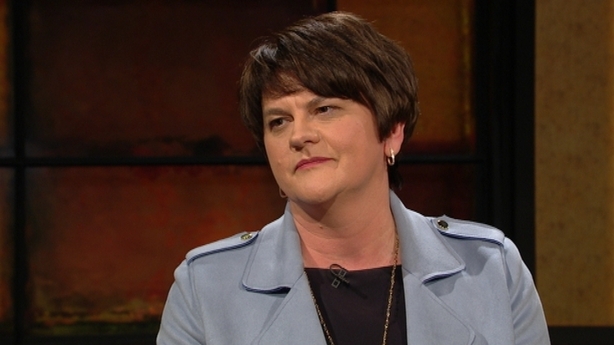
The DUP leader asked her main partner in government to come with her to a PSNI Recruitment event launch.
For years Sinn Féin has provided members to Northern Ireland's Policing Board but its leadership had never attended a PSNI recruitment event or a PSNI graduation ceremony.
Republicans often complain about the small numbers of Catholics in PSNI ranks compared to the numbers of Protestants. But particularly in nationalist areas, Sinn Féin’s support for the police has often been passive. And that's a mild description.
The PSNI will privately acknowledge it sometimes struggles to get access to recruitment fairs in catholic schools.
When Arlene Foster put it up to her to break the mould, Michelle O'Neill made her decision. In a telephone call, not to 'shadowy figures' in The Felons Club but to Sinn Féin party president, Mary Lou McDonald, the proposed policy shift was checked and approved.
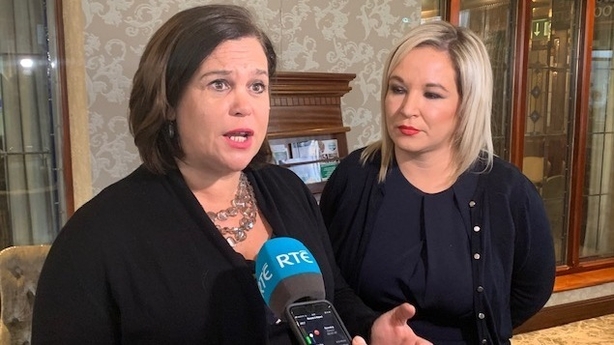
Declan Kearney, Sinn Féin’s national chairman and a junior minister in the power-sharing administration was in Michelle O'Neill's orbit but he wasn#t going to be part of what was a significant public move.
Instead Gerry Kelly, a former leading IRA member and now a Sinn Féin member on the policing board, was scrambled.
The PSNI top tier was not expecting their visitors - journalists had actually been told that Sinn Féin had not responded to the invitations. The formal speeches were over when Michelle O'Neill and Arlene Foster arrived with the normally dapper Gerry Kelly, dressed in denim jeans.
One senior officer, who for years has fought the good fight in recruitment and training, moved to a quiet corner and cried.
Sinn Féin's belated participation in that PSNI recruitment event at PSNI training headquarters outside Belfast led directly to a murder threat from dissident republicans.
Those who dismissed the warning as "Sinn Féin violin-playing" were soon chastened by the discovery of a crude pipe bomb near the Belfast home of a well-known republican and his mother in her 80s.
In 1989 RUC Superintendent Alwyn Harris, the father of Garda Commissioner Drew Harris, died from the wounds he received from the explosives device the IRA attached to his car.
In recent days, prominent Sinn Féin members in Northern Ireland have been doing what has been the practice of police officers and unionist politicians for decades - inspecting under their car before starting the engine.
Dealing with death threats from some of their former associates is one of the challenges Sinn Féin must expect and accept in its increased presence on the political centre stage.
Now there are more of them
Unexpected success also has pleasant sides. Ask the Sinn Féin member of Sligo County Council, Chris McManus about it.
A Sligo-town based councillor and the son of a former Sinn Féin national chairman, he was hoping to contest the 2020 General Election in Sligo-Leitrim.
But after setbacks in Presidential, European and Local Elections, the party decided to run just the one candidate, sitting TD Martin Kenny, in the four-seater constituency.
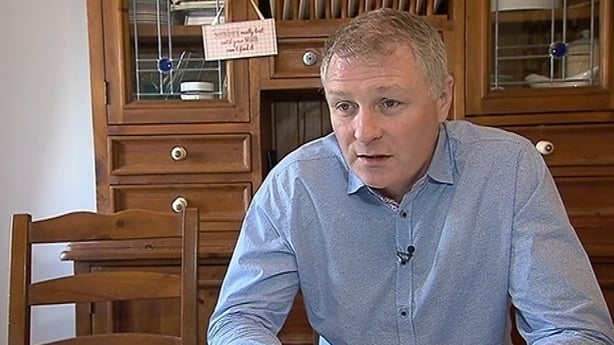
Mr Kenny, actually topped the poll with a with 15,035 votes, a 24.8% share and was elected on the first count.
The second successful candidate, Marian Harkin (Independent) had to wait until the 14th count and the other two, Marc MacSharry (Fianna Fáil) and Frank Feighan (Fine Gael) made it on the 15th count.
The "if only we had run two candidates regrets" in the Chris McManus camp were short lived. Over in Cavan-Monaghan, MEP Matt Carthy topped the poll and his transfers helped to elect a second Sinn Féin candidate, Pauline Tully.
Throughout the country the pattern of a Sinn Féin surge continued. When it came to deciding who would replace Matt Carthy in Brussels, substitutes on the official list became unavailable one by one, due to their success in making it to Dail Éireann.
So Chris McManus, the Sligo County Councillor who was dropped from the Sligo-Leitrim General Election ticket, may find himself Europe bound.
They will be better paid
There may be quite a significant change in the material circumstances of Sinn Féin's boosted numbers of elected representatives. And it is likely to be an all-Ireland phenomenon.
They have 66-year-old Dessie Ellis to thank for it.
He is a former IRA member who served a prison sentence for the possession of explosives and bomb-making equipment.
At the third attempt, he won a Dublin North West Dáil seat in 2011 and has retained it since. In the recent election he was the poll-topper in the three-seater constituency, elected on the first count with 14,375 votes, a 44% share.
In 2018 it became known that he had demurred from the Sinn Féin policy of elected members taking only the average industrial wage and making the rest available to the party.
In the course of the recent General Election campaign, Mary Lou McDonald detailed how for the past five years Sinn Féin TDs had taken their salary and made the maximum legal allowable donation to the party, of €2,500.
She also said she uses some of her salary to help fund her constituency offices in Cabra and at the Five Lamps, explaining "it is an expensive business that isn't covered by the expenses that we get".
She also stated "there's nobody in Sinn Féin who is elected to any office for big careers or big money".
North of the border, the nuancing of Sinn Féin’s salary arrangements is being closely monitored. A TD's basic annual pay is €96,000 compared to the £49,500 paid to members of the Stormont Assembly.
If the industrial wage only policy is being abandoned in Dail Éireann, it's likely that Sinn Féin’s Northern Ireland representatives will pursue similar arrangements.
On the issue that made it different to all the major parties, south and north - taking the industrial wage and pitching the rest of the salary into party coffers - Sinn Féin is on a journey towards what is standard practice.
Northern Ireland will remain the laboratory
Four of the five Sinn Féin rallies that spooked their Dail Éireann opponents were held south of the border with the fifth taking place in Newry.
The giddy energy is the direct product of the unexpected General Election success. In the days immediately after the shock results, significant numbers of Sinn Féin's Stormont-based team were deployed south.
When the DUP were propping up Theresa May’s government, the party often found Westminster had first call on its limited resources and Stormont-based requirements suffered.
In a mirror image of the DUP's stretched bandwidth experience, Sinn Féin found Leinster House took priority over Stormont in the euphoria of the post General Election outcome.
But Northern Ireland is the only place on the island where Sinn Féin is a prominent player in government. It is the laboratory where Sinn Féin has been gaining experience exercising the levers of power.
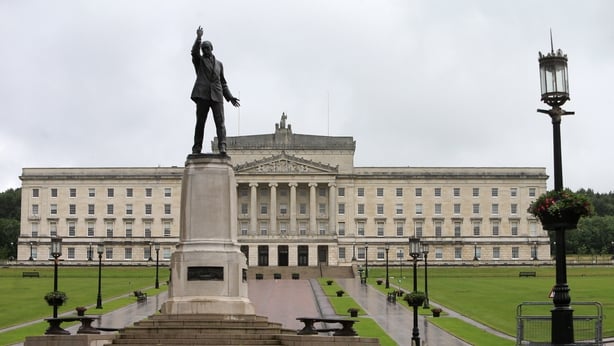
In the coming weeks it faces a number of unavoidable events that will test its capacity to function coherently and effectively as a force in government.
Since the 1998 Good Friday Agreement, after which devolved government replaced direct rule, Westminster and the British government were always seen as places that could be squeezed for extra cash when the Stormont sums didn't add up.
Contentious issues, like how to deal with the legacy of the past, the hundreds upon hundreds of unsolved murders included, were never adequately tackled.
For the three recent years when Stormont remained closed, civil servants avoided significant policy decisions and problems in areas including health, education and infrastructural investment were left to fester and deteriorate.
Many of those factors are coming to the boil. Conor Murphy, the Sinn Féin Finance Minister, says an additional £600m top-up from Westminster is needed to fill the hole in current expenditure requirements. Multiples of that figure will be required to fund capital expenditure across a whole range of areas.
The signals from London are far from encouraging. The Boris Johnson-Dominic Cummings masterplan is showing no signs of having a section marked 'Northern Ireland’s special circumstances'.
The Brexit process gathers momentum. Storm Dominic, the invention of the man who has faith in chaos, is coming. For Northern Ireland's new five-party government, the honeymoon is about to end and extremely difficult unavoidable choices beckon.
Before a new Dáil administration is formed and bedded in, Stormont is on course to be the place where Sinn Féin’s ability to make hard political choices will be tested.
A bridge too far in Washington?
If the coronavirus doesn't halt international travel, the Ireland Roadshow will shortly depart for the United States. Once more the main 'shamrock events' are scheduled to be held on the week before St Patrick’s Day.
Leo Varadkar will do his best to shake off the hangdog look in his role as caretaker Taoiseach. Sinn Féin will be in overdrive promoting their new improved brand. They almost sound like a country and western band - Mary Lou and the Barbarians.
Michelle O'Neill and Arlene Foster will be there too - reviving memories of when the DUP/Sinn Féin Chuckle Brothers act, Ian Paisley and Martin McGuinness, were a big hit Stateside in 2007.
For those who chart the long and as yet unfinished journey of the republican movement from paramilitaries to a party of government, north and south, keep a watchful eye on one factor. It is small but significant.
In May 2011, then president Mary McAleese invited Martin McGuinness to the banquet at Dublin Castle, marking the first official visit of Queen Elizabeth to Ireland. But his party wouldn't allow the Northern Ireland’s deputy first Minister to attend.
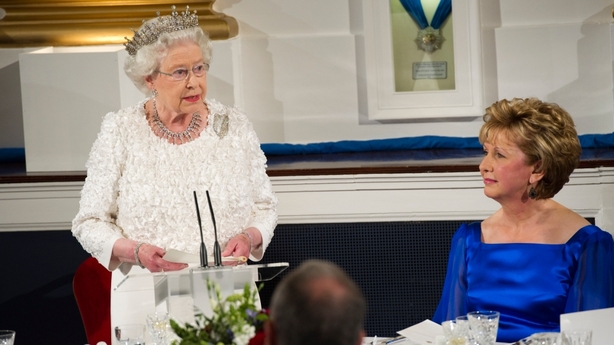
Sinn Féin subsequently changed its policy. Mr McGuinness was delighted to meet the Queen, her husband and her son, Prince Charles, a number of times.
In May 2015 Gerry Adams, Sinn Féin’s president, met Prince Charles for the first time at an event in NUI Galway. Two years later, at a reception in the British Ambassador’s Dublin residence, the pair met again and the Prince remarked "you are even older than me" as they shook hands in front of the cameras.
There wasn't much fuss made of it at the time but there was extraordinary symbolism in that event.
Thirty-nine years before, the IRA had assassinated the serving British ambassador, Christopher Ewart Biggs and a 26-year-old colleague, Judith Cooke, by detonating a huge bomb as he was driven from that same Glencairn home in the Dublin mountains towards the city.
In a fortnight's time, Mary Lou McDonald, Michelle O'Neill and Arlene Foster will be among the guests at the Shamrock Ceremonies in The White House, the Ireland Funds Dinner and the reception at the Irish Embassy in Washington, hosted by Ambassador Dan Mulhall.
Since the DUP and Sinn Féin entered power-sharing in 2007, Ian Paisley, Peter Robinson and Arlene Foster have put their discomfort aside and turned up at that string of emphatically Irish events in Washington.
But despite Sinn Féin’s shifts in meeting members of the royal family and its president attending a reception at the British Ambassador's residence in Dublin, it has never accepted an invitation to an event at the British Embassy in Washington during the S Patrick's celebrations.
In September 2004, Ian Paisley agreed to meet the then taoiseach Bertie Ahern at the Irish Embassy in London - the breakfast where the DUP leader asked for boiled eggs to reduce the chance of being poisoned.
Almost 16 years later, on 13 March 2020, the British Embassy in Washington is hosting a breakfast event. The DUP leader, Arlene Foster, will be there. Sinn Féin’s deputy first minister in Northern Ireland, Michelle O'Neill, has been invited but is likely to have "prior commitments".
For Sinn Féin, attending a March function at the British Embassy in Washington may continue to be a bridge too far.
It so happens that on the day when Arlene Foster will be a guest at the British Embassy event without her partner in government, across the Atlantic, in Stormont, the public inquiry report into the Renewable Heat Incentive controversy - the so-called cash for ash scandal - will be published.






